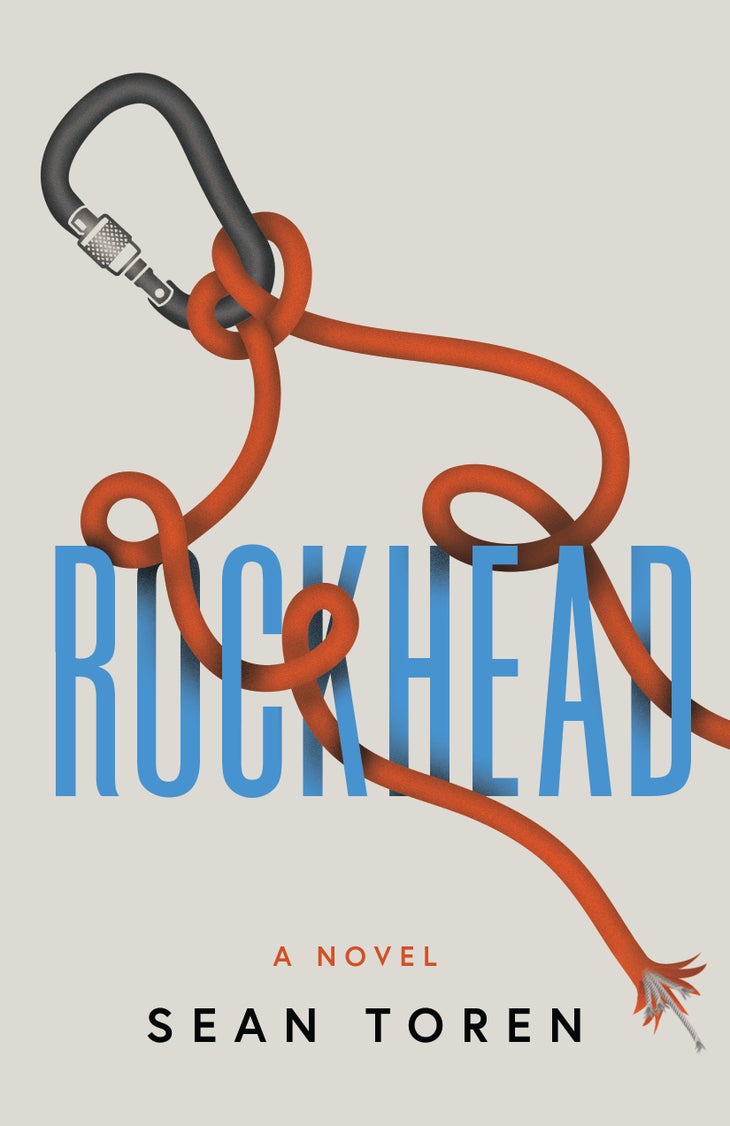Heading out the door? Read this article on the new Outside+ app available now on iOS devices for members! Download the app.

Climbing fiction is a rarity, especially in novel form, and especially done well. So it was a real treat to get my hands on an early copy of Sean Toren’s ambitious Rockhead: A Novel. A robust 300-plus pages, the book follows two main characters, Atlas and Dade, on a classic American road trip through the West. As they bounce from crag to crag in Dade’s beater 1980 van, Makin’ Bacon, the two longtime climber partners are working their way up to an ascent of Seven Seas, a fictional big wall on El Capitan. Along the way, their lives intertwine with a former love interest of Atlas’s, Ruby, and her climbing partner, Fran, as well as with two young, wet-under-the-gills climbers, Red and Luther.
The climbing action takes place mainly at the Needles, South Dakota, and on Devils Tower and El Capitan. Readers familiar with these venues will appreciate Toren’s deft, descriptive prose, which, with Toren himself a core, dedicated climber, puts you right there on the rock with his characters. It is here, perhaps, that the book is strongest: As Atlas struggles with a gnarly roof crack in the Needles, Toren lays it out thusly: “Hanging parallel to the ceiling from one arm, one foot, I panicked and ripped the whole rack up onto my ribs, knocking the number two out of my mouth”—who can’t relate to some pumped, gripped gear bobble like this? In moments like these it becomes clear that this is a book written by a climber for climbers—no tedious, unneeded descriptions of, say, what a No. 2 Camalot is for the uninitiated.
The book is written in the first person, from Atlas’s point of view, and as such is very much an internal novel. Like many young, somewhat-detached-from-society climbing vagabonds, Atlas seems to have his roots in no particular place, and Dade, married and with his first child on the way, while nominally more grounded in “real life,” may in fact be more wedded to the peripatetic climbing lifestyle yet—and is certainly the looser cannon up on the rock where he takes big risks, gunning for big rewards. As the two men navigate their insatiable hunger to climb and to push themselves ever harder on dangerous leads in the run-up to Seven Seas, we also see how their stereotypical but not-inaccurate climber selfishness bleeds into their ability to initiate and nurture meaningful romantic relationships with women. Male climbers are often accused—myself included, in my younger decades—of being overgrown, needy, selfish man-children, and Atlas and Dade certainly do nothing to disabuse the reader of such notions. In this sense, Toren nails it—Atlas and Dade feel lived in and believable. We’ve all met these guys—or been them. And while you probably won’t cheerlead their behavior, I imagine climbers of all genders will be able to relate to it. On the flip side, my one frustration with Rockhead is that we, in places, spend what felt like too much time on the soap opera aspects of the characters’ lives, with a few too many scenes set at camp or with Atlas on the phone to his ex-girlfriend when I just wanted to get back to the rocks and go climbing (I know, typical climber behavior…). Still, such scenes move the narrative along and are effective in revealing more about the characters’ interior lives.
To reveal too much of the plot would be to give away spoilers. Suffice it to say that Toren’s novel drives right to the heart of the pathos and tragedy that all too often inform our sport, and I found myself more than once wanting to flip ahead in some moment of dramatic climbing action to see what happened—because I wanted it to end well. The title centers on Atlas and Dade’s shared concept of the “rockhead,” essentially those moments where you leave fear and thought behind and enter a flow state—and simply go for it, regardless of the consequences. As they journey around the West, both men seek in their own way to cultivate the rockhead. But it is their final goal, Seven Seas, that will ultimately help them realize their ambitions—though probably not how you’d predict, which is what makes Rockhead so suspenseful.
If you’re a fan of climbing fiction, fiction, or climbing literature in general, I’d strongly encourage you to give Rockhead a read. It’s very well written, it’s something different, and much like Chris Kalman’s recent entry into the genre, As Above, So Below, it will leave you haunted and pondering for days after you finish the novel.
Paperback: $15.99, itascabooks.com/rockhead; ebook: $9.99, books2read.com/u/47El98
